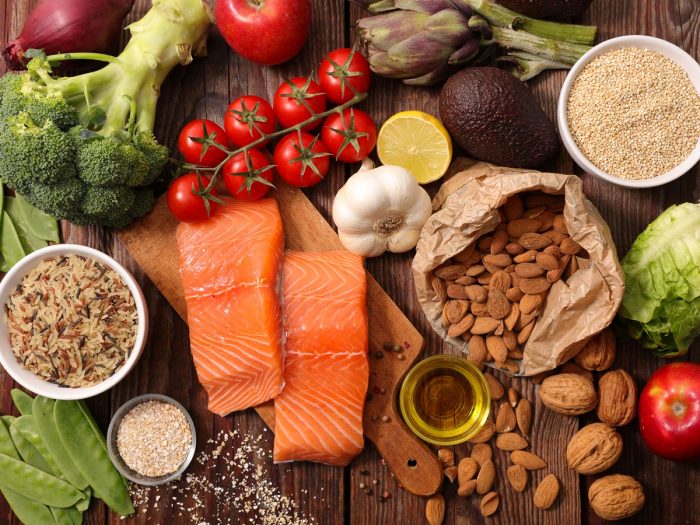If you are looking to improve your gut health and lose weight in a sustainable manner, the Microbiome Diet may be the diet program you are looking for. It calls for eliminating refined carbohydrates and adding more organic, plant-based foods as well as fermented foods. Let’s find out more!
What is Microbiome Diet?
The Microbiome Diet focuses on restoring the microbiome and gut health in the body through specific foods to boost overall health and aid sustainable weight loss. The three-phase program was developed by Dr. Raphael Kellman, M.D., and author of “The Microbiome Diet: The Scientifically Proven Way to Restore Your Gut Health and Achieve Permanent Weight Loss”. The book, published in 2014, details the guidelines for the diet and has several recipes to heal your gut. These recipes are rich in probiotic foods and prebiotic foods, both of which help balance the good bacteria in the system. [1]

It’s easy to eat healthy when your pantry is stocked with healthy foods like fresh fruits, vegetables, and nuts. Photo Credit: Shutterstock
Several other diets, other than the Microbiome Diet, have talked about the importance of the microbiome health. According to a 2017 study published in the Journal of Translational Medicine, the human gut microbiome is essentially all microorganisms present in the intestinal tract, including bacteria, viruses, fungi, and protozoa. The microbiome plays an essential part in reducing the risk of health conditions like inflammatory bowel disease, obesity, cardiovascular disease, and cancer. A healthy gut also helps eliminate cravings and manage weight. [2] [3]
Microbiome Diet Guidelines
There are three broad phases in the Microbiome Diet Plan. During the first phase which lasts for three weeks, foods that contain sugar, gluten, and trans fats, as well as dairy products, are completely eliminated from the diet. You are encouraged instead to eat plant-based, organic foods. The diet also calls for a lifestyle change and asks you to opt for natural cleaning products and avoid antibiotics. The Microbiome Diet also suggests that the person take supplements, particularly in the first phase, such as glutamine, grapefruit seed extract, garlic, and oregano oil.
Phase two has a term of four weeks, where a few foods are re-introduced such as certain kinds of dairy products and legumes. The final phase is eating according to what your body naturally adjusts to and what it rejects. It’s where you understand what foods work best for your body.
Foods To Avoid
According to the Microbiome Diet, you need to avoid foods that could potentially affect your gut health. These include:
- Processed foods
- Sugar, high fructose corn syrup, artificial sweeteners (small amounts of Lakanto is allowed) [4]
- Transfats and hydrogenated fats
- All products containing gluten
- Eggs and milk (butter and ghee are allowed)
- Deli meat
- High-mercury fish like orange roughy, shark, etc
- Fruit juices and dried fruit
- Soy, peanuts, and any kind of legumes (chickpeas and lentils are allowed)
- Starchy fruits and vegetables like bananas, corn, potato, and peas
- Yeast and foods containing yeast
Foods To Eat
Different phases call for different kinds of foods, but as a general rule, processed foods and sugar need to be avoided. Let us look at the foods that can be eaten in certain phases of the Microbiome Diet.
- Vegetables which are non-starchy such as asparagus, leeks, carrots, onions, radishes, yams, and sweet potatoes
- Fermented foods like sauerkraut and kimchi [5]
- Fruits that are non-starchy like oranges, apples, grapefruit, kiwi, tomatoes, and avocado
- Fats such as all varieties of nut butter, olive oil, sunflower oil
- Nuts and seeds of all kinds
- Dairy products such as kefir and yogurt [6]
- Protein sources like organic, grass-fed meat, free-range eggs, and low-mercury fish such as wild salmon
- Gluten-free grains like amaranth, gluten-free oats, millet, basmati rice, brown rice, and wild rice
- Herbs and spices like turmeric
Takeaway
The Microbiome Diet is a strict diet that involves eliminating important food groups, especially in the first phase. It may be tough for people to follow and adhere to. However, if you have been suffering from gut health issues, allergies, food sensitivities, or chronic diseases, it may be well worth a try to tune up your gut health to improve overall health and manage your weight.
